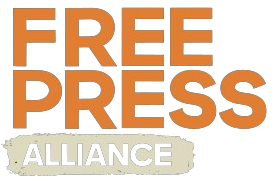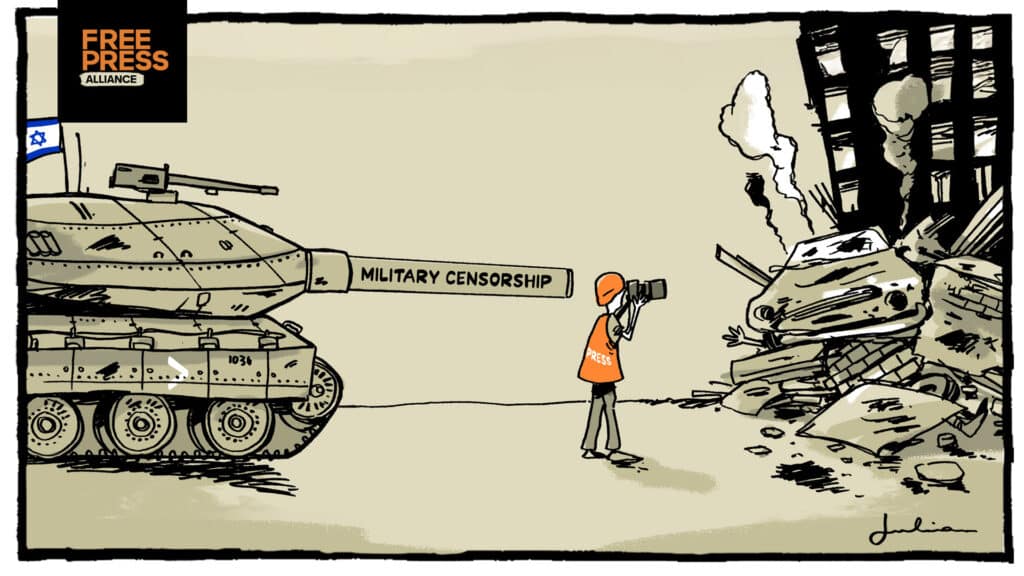Freedom of the press is a cornerstone of any democratic society, acting as a check on state power and ensuring transparency, especially during times of war. Yet, in the context of Israel’s ongoing conflicts with Iran and Palestine, this fundamental right has come under sustained and systematic attack. The Israeli government’s increasingly aggressive stance toward both local and international journalists during wartime illustrates a troubling trend: using national security as a pretext to silence independent reporting.
Censorship by law: a militarized approach to media
One of the clearest manifestations of Israel’s press repression is its military censorship regime. In June 2025, amid heightened tensions with Iran, the Israeli military issued new directives under the “Rising Lion” censorship guidelines. These rules forbid journalists from publishing images or reports of missile or drone strike sites without prior approval from military censors. Violators face up to 30 months in prison, making this one of the most draconian censorship frameworks in a democratic country (Al Jazeera).
This system is far from symbolic. In 2024 alone, over 1,635 full articles were blocked, and more than 6,265 others had restrictions imposed on them by military censors (+972 Magazine via Al Jazeera). These figures illustrate not only the scale of intervention but also the chilling effect on journalistic inquiry.
Targeting foreign media: the Al Jazeera law and beyond
The Israeli government’s antagonism toward foreign media reached new heights in April 2024, when the Knesset passed the so-called “Al Jazeera Law.” This legislation empowers authorities to close foreign media outlets deemed a threat to national security. The law has already been used to shut down Al Jazeera’s offices in Jerusalem and to seize equipment from Associated Press journalists broadcasting live footage from northern Israel (The Times of Israel).
More recently, during the flare-up with Iran in June 2025, the Communications and Security ministries issued new directives requiring journalists, both domestic and international, to obtain written police approval before publishing material related to attacks. Violations were declared criminal offenses, further tightening the noose around press freedom (Committee to Protect Journalists, CPJ).
Silencing Palestinian and Arab-Israeli journalists
While international reporters have faced restrictions, Palestinian and Arab-Israeli journalists bear the brunt of Israel’s crackdown. According to the International Federation of Journalists (IFJ), at least 26 Palestinian and Arab-language journalists were harassed, blocked from coverage sites, or physically attacked during the June 2025 hostilities with Iran. Several were detained without charge, even when properly accredited.
In Gaza, the situation is catastrophic. Since October 7, 2023, over 185 Palestinian journalists have been killed, making it one of the deadliest conflicts for media workers in recent history (The Guardian). This staggering toll not only devastates the press corps but also leaves a massive information vacuum, as foreign journalists are largely barred from entering Gaza to conduct independent reporting.
The global response: condemnation and concern
Israel’s actions have drawn sharp criticism from international watchdogs. Reporters Without Borders downgraded Israel to 112th out of 180 in its 2025 World Press Freedom Index, citing “unprecedented state interference.” The Committee to Protect Journalists (CPJ) has condemned Israel’s use of the Iran conflict as a justification for increasing its assaults on press freedom, noting multiple cases of equipment confiscation, arbitrary detention, and verbal threats.
Organizations like ARTICLE 19 have warned that Israel’s censorship regime fosters a climate of impunity for human rights abuse. Without the ability to document or investigate wartime actions, journalists are unable to fulfill their role as public watchdogs, and civilians are denied the right to know.
Conclusion: the cost of silence
Israel’s efforts to restrict press freedom during conflicts with Iran and Palestine constitute more than isolated acts of censorship; they represent a systematic attempt to control narratives, suppress dissent, and shield military actions from scrutiny. Whether through legislation, military directives, or outright violence, the message to journalists is clear: there are red lines that must not be crossed.
In democracies, the press must be free, especially during war. When governments suppress the media, they suppress the truth. And in doing so, they deny both their citizens and the international community the opportunity to hold power accountable.

